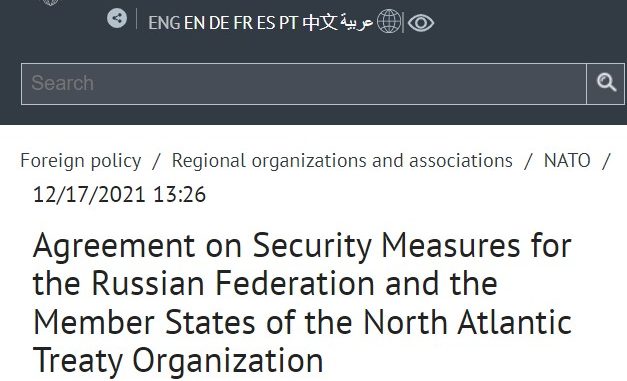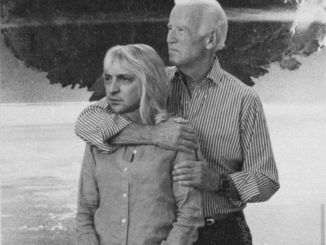
The Russian Federation and the member states of the North Atlantic Treaty Organization (NATO), hereinafter referred to as the Participants,
Reaffirming the desire to improve relations and deepen mutual understanding;
recognizing that in order to effectively respond to modern challenges and threats to security in an interdependent world, it is necessary to unite the efforts of all Participants;
Convinced of the need to prevent dangerous military activities and thus reduce the possibility of incidents between their armed forces;
Noting that the security interests of each Participant require an increase in the effectiveness of multilateral cooperation, strengthening stability, predictability and transparency in the military-political field;
Reaffirming their commitment to the purposes and principles of the Charter of the United Nations, the Helsinki Final Act of the 1975 Conference on Security and Cooperation in Europe, the Founding Act on Mutual Relations, Cooperation and Security between the Russian Federation and the North Atlantic Treaty Organization of 1997, the Code of Conduct relating to military-political 1994 Security Aspects, the 1999 Charter for European Security and the 2002 Rome Declaration “NATO-Russia Relations: A New Quality” of the heads of state and government of the Russian Federation and NATO member states;
agreed on the following:
Article 1
The participants in their relations are guided by the principles of cooperation, equal and indivisible security. They do not strengthen their security individually, within the framework of an international organization, military alliance or coalition at the expense of the security of others.
The participants, in their relations, undertake to settle all international disputes peacefully, and also to refrain from any use of force or the threat of its use in any way inconsistent with the purposes of the United Nations.
Participants undertake not to create conditions or situations that could represent or be regarded as a threat to the national security of other Participants.
Participants will exercise restraint in military planning and exercises to reduce the risks of possible dangerous situations, adhering to obligations under international law, including those contained in intergovernmental agreements on the prevention of incidents at sea outside territorial waters and in the airspace above it, as well as in intergovernmental agreements on the prevention of dangerous military activities.
Article 2
To resolve issues and resolve problematic situations, the Participants use the mechanisms of urgent consultations on a bilateral and multilateral basis, including the Russia-NATO Council.
Participants on a regular voluntary basis exchange assessments of modern threats and challenges to security, provide mutual information about military exercises and maneuvers, the main provisions of military doctrine. In order to ensure transparency and predictability of military activities, all available mechanisms and instruments of confidence-building measures are used.
To maintain emergency contacts between the Participants, “hot” telephone lines are organized.
Article 3
Participants confirm that they do not consider each other as opponents.
The participants maintain a dialogue and interact to improve the mechanisms for preventing incidents on the high seas and in the airspace above it (primarily in the Baltic and the Black Sea region).
Article 4
The Russian Federation and all Participants that, as of May 27, 1997, were Member States of the North Atlantic Treaty Organization, respectively, do not deploy their armed forces and weapons on the territory of all other states of Europe in addition to the forces stationed on that territory as of May 27 1997. In exceptional cases, when situations arise related to the need to neutralize the threat to the security of one or more Participants, such placements can be carried out with the consent of all Participants.
Article 5
Participants exclude the deployment of ground-based intermediate and shorter-range missiles in areas from which they are capable of hitting targets on the territory of other Participants.
Article 6
Participants that are member states of the North Atlantic Treaty Organization assume obligations that preclude further expansion of NATO, including the accession of Ukraine, as well as other states.
Article 7
Participants that are member states of the North Atlantic Treaty Organization renounce any military activity on the territory of Ukraine, as well as other states of Eastern Europe, Transcaucasia and Central Asia.
In order to prevent the occurrence of incidents, the Russian Federation and the Participants that are member states of the North Atlantic Treaty Organization do not conduct military exercises and other military activities above the brigade level in a strip of agreed width and configuration on each side of the border line of the Russian Federation and the states that are with it in a military alliance, as well as Participants that are member states of the North Atlantic Treaty Organization.
Article 8
This Agreement does not affect and will not be interpreted as affecting the primary responsibility of the UN Security Council for the maintenance of international peace and security, as well as the rights and obligations of the Members arising from the UN Charter.
Article 9
This Agreement shall enter into force on the date of deposit with the depositary of notifications of consent to be bound by more than half of the signatory states. With respect to a State that transmitted such notification later, this Agreement shall enter into force on the date of its transmission.
Any Party to this Agreement may withdraw from it by sending a notice to the depository. This Agreement shall terminate for such Participant in [30] days after receipt by the depositary of the said notice.
This Agreement has been drawn up in the Russian, English and French languages, the texts of which are equally authentic, and shall be kept in the archives of the depositary, which is the government of …
Done in [city …] [XX] day [XXX] of the month [20XX] of the year.



Be the first to comment